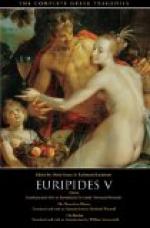O conqueror, come! The king that trampled Troy
Knoweth his son Orestes. Come in joy,
Brother, and take to bind thy rippling hair
My crowns!.... O what are crowns, that runners
wear
For some vain race? But thou in battle true
Hast felled our foe Aegisthus, him that slew
By craft thy sire and mine. [She crowns ORESTES.
And
thou no less,
O friend at need, O reared in righteousness,
Take, Pylades, this chaplet from my hand.
’Twas half thy battle. And may ye two stand
Thus alway, victory-crowned, before my face! [She
crowns PYLADES.
ORESTES.
Electra, first as workers of this grace
Praise thou the Gods, and after, if thou will,
Praise also me, as chosen to fulfil
God’s work and Fate’s.—Aye,
’tis no more a dream;
In very deed I come from slaying him.
Thou hast the knowledge clear, but lo, I bring
More also. See himself, dead!
[Attendants bring in the
body of AEGISTHUS on a bier.
Wouldst
thou fling
This lord on the rotting earth for beasts to tear?
Or up, where all the vultures of the air
May glut them, pierce and nail him for a sign
Far off? Work all thy will. Now he is thine.
ELECTRA.
It shames me; yet, God knows, I hunger sore—
ORESTES.
What wouldst thou? Speak; the old fear nevermore
Need touch thee.
ELECTRA.
To let loose upon the dead
My hate! Perchance to rouse on mine own head
The sleeping hate of the world?
ORESTES.
No man that lives
Shall scathe thee by one word.
ELECTRA.
Our city gives
Quick blame; and little love have men for me.
ORESTES.
If aught thou hast unsaid, sister, be free
And speak. Between this man and us no bar
Cometh nor stint, but the utter rage of war.
[She goes and stands over
the body. A moment’s silence.
ELECTRA.
Ah me, what have I? What first flood of hate
To loose upon thee? What last curse to sate
My pain, or river of wild words to flow
Bank-high between?... Nothing?... And yet
I know
There hath not passed one sun, but through the long
Cold dawns, over and over, like a song,
I have said them—words held back, O, some
day yet
To flash into thy face, would but the fret
Of ancient fear fall loose and let me free.
And free I am, now; and can pay to thee
At last the weary debt.
Oh,
thou didst kill
My soul within. Who wrought thee any ill,
That thou shouldst make me fatherless? Aye, me
And this my brother, loveless, solitary?
’Twas thou, didst bend my mother to her shame:
Thy weak hand murdered him who led to fame
The hosts of Hellas—thou, that never crossed
O’erseas to Troy!... God help thee, wast




